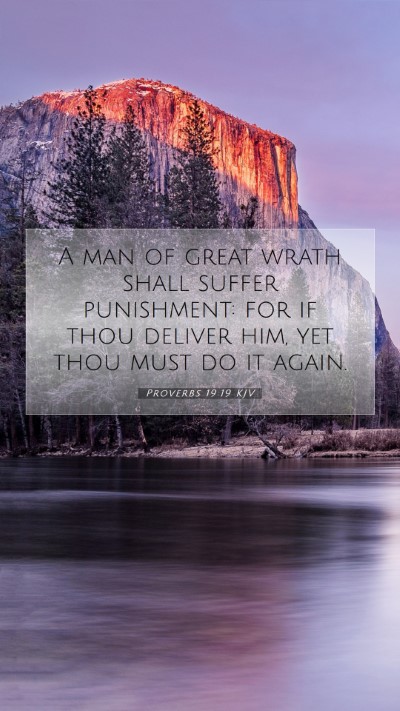Understanding Proverbs 19:19
Proverbs 19:19 states, "A man of great wrath shall suffer punishment: for if thou deliver him, yet thou must do it again." This verse highlights the consequences of anger and the relentless cycle of retribution associated with a wrathful individual.
Summary of Meaning
This proverb serves as a warning against irrational anger and the ensuing troubles it can cause in one's life. The wisdom encapsulated in this verse suggests that dealing with someone who is prone to rage can often lead to recurring conflicts.
Insights from Public Domain Commentaries
Matthew Henry's Commentary
Matthew Henry observes that violent anger brings about self-destructive outcomes. He proposes that a wrathful person not only harms others but ultimately invites punishment upon themselves. Those who engage with such individuals may find that their attempts to intervene only lead to further complications and resentments.
Albert Barnes' Commentary
Albert Barnes emphasizes the nature of a wrathful person, leading to both personal and relational troubles. He notes that an individual who is quick to anger is likely to find themselves in a continual cycle of conflict. Delivering such a person from the consequences of their actions might merely lead to a repeat of the same scenario.
Adam Clarke's Commentary
According to Adam Clarke, the verse can be understood as a reflection on the futility of addressing the problems caused by a characteristics anger. Clarke suggests that no matter how many times one might help a wrathful person, the underlying issues remain unaddressed, causing a persistent need for help.
In-Depth Bible Verse Analysis
The phrase "a man of great wrath" indicates an individual with a volatile temperament, often responding to situations with disproportionate anger. Understanding the implications of such behavior is vital for effective social interactions:
- Social Relationships: The wisdom found in this verse encourages healthy boundaries in relationships with individuals who have uncontrollable anger.
- Personal Reflection: It prompts an individual to evaluate their anger responses to avoid the pitfalls depicted.
- Mediation and Conflict Resolution: The verse offers insight into the difficulty of managing conflicts with angry individuals.
Biblical Exegesis and Application
This verse not only serves as a commentary on the individual but also extends to the broader implications of community and society. The Bible repeatedly warns against the dangers of uncontrolled anger:
- Proverbs 14:29: "He who is slow to anger has great understanding, but he who is quick-tempered exalts folly."
- Ecclesiastes 7:9: "Do not be hasty in your spirit to be angry, for anger lodges in the bosom of fools."
- James 1:20: "For the anger of man does not produce the righteousness of God."
Conclusion
Proverbs 19:19 offers profound insight into managing personal emotions and navigating relationships with angry individuals. By understanding the consequences associated with wrath, individuals can cultivate patience and forge healthier relationships.
For Bible Study Groups
This verse can be a powerful topic in Bible study groups. Consider discussing:
- Real-life applications of managing anger.
- Scriptural examples of both wrathful characters and those who demonstrate patience.
- The cycle of conflict and resolution within families and communities.
SEO Content for Bible Study Resources
In exploring the meaning of Bible verses, Proverbs 19:19 presents a relevant case for understanding Scripture. This Bible verse explanation provides not only a succinct Bible verse commentary but offers a framework for applying these principles in daily life. For those engaged in online Bible study, this verse serves as an excellent discussion point.
Further Study Suggestions
For additional insights and deeper understanding, readers are encouraged to explore:
- How to interpret Bible verses in light of their cultural context.
- Methods for recognizing and applying childhood lessons on conflict avoidance.
- Classes and seminars focused on Bible study tools that explore the emotional narratives found throughout the Scriptures.


